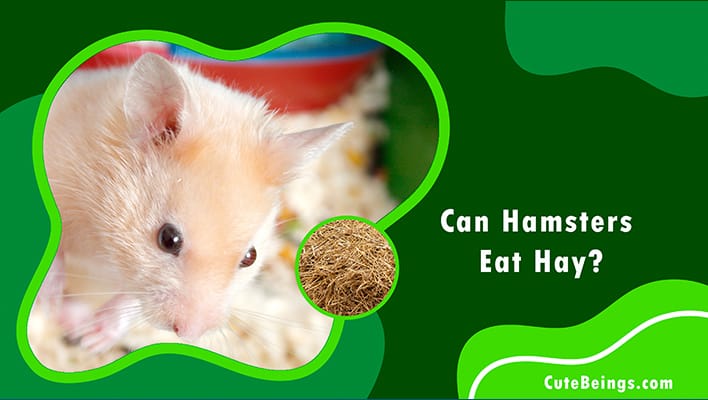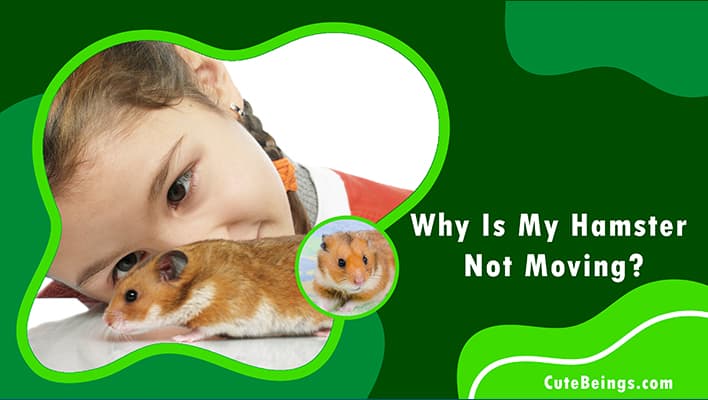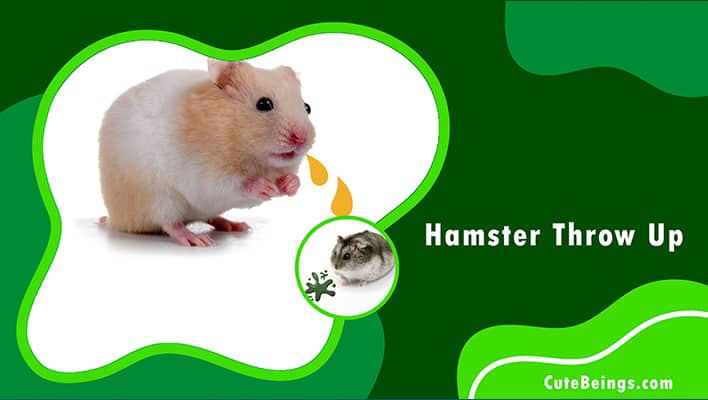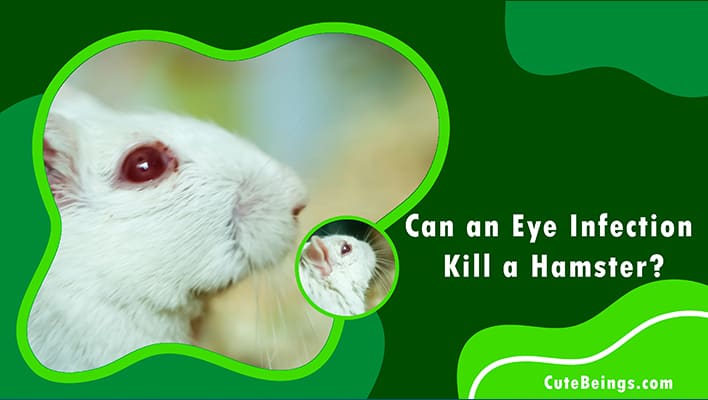Once, my student asked me, “Can a hamster eat hay?” I was not sure back then. So I told her I would check and let you know. So after a little bit of research, I found out hamsters can eat hay. Although they can consume hay, hamsters don’t require it like guinea pigs do. Instead, they won’t eat it unless it complements their regular meals. Although hay has some nutritional advantages for hamsters, it won’t significantly alter the composition of their diet.
Not all hamsters like to eat hay, some like to chew it. The fibrous materials will help them file down their teeth because they won’t be able to swallow.
Some hamsters just don’t care for the flavor of hay. If that’s the case, after trying it out once, they won’t give it another thought.
Table of Contents
Do hamsters like hay?
Yes, hamsters like hay. But they do not depend on hay. They can live without it in complete safety. But hay is a reasonably priced food option that can offer a lot of fiber and nutrition. There is very little risk from hay. On the other hand, hay is a good bedding material for hamsters.
Is hay safe for hamsters?
Yes, of course. Actually, it has a lot of advantages. It serves as
Orchard
- Nourishment
- A natural behavioral simulator
- A dental health booster
- Soft , fresh bedding, among other things
For healthy digestion and proper motility, hamsters need a high-fiber diet. Fresh hay can be fed every day and is naturally quite high in fiber. Hay works wonders to stimulate and encourage foraging behavior. Additionally, hay helps to maintain appropriate tooth wear, which prevents dental problems like malocclusion (tooth misalignment).
When there are other “treats” available, some hamsters may not be interested in eating the hay. To avoid obesity and other problems with weight control, it’s vital that you keep such snacks to a minimum.
Hamsters thrive when provided with hay, and meadow, Timothy, and grass are excellent options. A hamster will be more inclined to consume them because they are typically more flavorful varieties of grasses.
Make sure you choose fresh hay of high quality; seek out products marked as being dust-free. Getting dust-free hay is a good idea because hamsters who inhale dust can develop respiratory problems. particularly hazardous for such tiny organisms.
Freshness is also essential because it will guarantee that it is tasty for your hamster and that it stays wholesome and nutritious.
If you already have a supply of food and bedding for your hamster, you can always add some hay when it’s time to restock or clean their bowls and cage.
Nutrient Value of hay
Since the majority of the nutrients in hay were broken down during the drying process, there aren’t many nutrients left in it. Hay is good because it is so fibrous, it aids in maintaining a proper flow.
Health benefits of nutrients which are found in hay
Hay aids in digestion and helps your hamster maintain a healthy weight. It gets rid of any sweets that might have clogged them up or made them put on a lot of weight because of a slowed metabolism.
Health risks (disadvantages) of hay
There aren’t any significant risks associated with giving them this reward; they will generally be content to chew on it.
Because hamsters are smaller rodents than guinea pigs and rabbits, they have a harder time chewing larger and more difficult pieces of hay. Additionally, compared to other rodents, they may have a harder time digesting these bits.
The threat to your furry pet is not implied by any of this, though. Hay has not been proven to produce any allergic reactions in them, and they won’t overindulge in it either.
It is essential to let your hamster’s hay air out before giving it to them because it can be dusty. They won’t get damaged by the hay, but breathing difficulties could result from too much agitated dust.
Hay is not a favorite of all hamsters. You might try different types of hay if your pet doesn’t seem to be drawn to the taste or fragrance at all. However, it is not essential to their diet. They don’t need to be dragged too far toward it.
Can hamsters eat meadow hay?
Yes, hamsters can eat meadow hay. In comparison to the other grasses, meadow hay is more universal, less expensive, and more readily available.
You need to be vigilant and determine whether this hay is suitable for your hamster because meadow hay has a wide variety, and your hamster may simply pick the high-calorie bits and ignore the rest.
Can hamsters eat timothy hay?
Yes, they can. When compared to other grasses, Timothy hay has a low protein concentration and a high fiber content. It promotes regular bowel movements, a healthy weight, and sound digestion.
Can hamsters eat alfalfa hay?
Yes, they like to eat alfalfa hay. Alfalfa hay is occasionally given to hamsters by their owners; however, due to its high calcium content, it should only be given to young, pregnant, or nursing hamsters. This can be harmful in excess.
Can hamsters eat Orchard hay ?
Yes, they can. In comparison to other grasses, orchard hay contains more calories, more protein (10–12%), and the same amounts of calcium and phosphorus as timothy hay.
Can hamsters eat Botanical hay ?
Hamsters should not be given botanical hay as their primary source of hay. because it contains clover, which can result in excessive calcium levels. Western Timothy hay is combined with lavender, chamomile, clover, and lemon balm to create botanical hay.
But on the other hand, hay is the ideal treat for hamster. It is also excellent for hay-finicky eaters who have trouble finding hay they like.
How should you serve hay to your Hamster?
You should hold your hamster whenever you give it rewards. It will improves your relation with the hamester. To determine whether your hamster likes hay, only offer them a small amount at first. It is no use if they reject it.
First of all you should wash the hay well. This removes any chemicals that may have been applied to the hay to keep it safe while it was growing. Pesticides can be unhealthy for your hamster.
Consider incorporating delicacies like pumpkin seeds, cabbage, and carrots in your hamster’s daily diet, along with hay. Having a lot of fruit and vegetables will benefit your ham.
Your pet may occasionally begin to sneeze if the hay has an adverse effect on their nose. If this occurs, you can switch the hay’s brand or get rid of it entirely. If you add too much hay, it may become problematic because it is very dusty. Take off the jagged hay pieces before giving them anything. Hamsters frequently pouch hay, and if the cheek poach is broken, your hamster could suffer greatly.
Hamster hay feeder
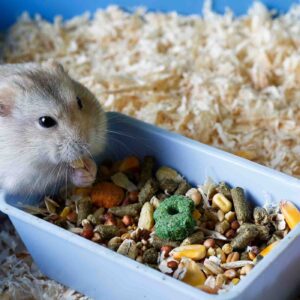
The Hamster Hay Feeder gives your small pet a free way to consume hay whenever they need it.
By keeping clean hay in the feeder during the day, you can reduce waste and clutter.
It is also easy to clean. It will save time and maintain hygienic safety with this simple-to-install and uninstall cage accessory. You can buy hamster hay feeders in many online stores, or you can make them yourself.
How much hay should you give your hamster?
While many animals, such as grazing livestock like cattle and horses and house pets like rabbits and guinea pigs, need a daily supply of hay in their diets to survive, this is not the case for hamsters. Since it is not necessary, you can live without it.
However, hay is an excellent source of vitamins and fiber. In addition to supporting tooth health, it can aid in maintaining a healthy digestive system.
Even if your hamster doesn’t require it every day, you can give it to him two or three times per week as a healthy supplement.
Frequently Asked Questions (FAQ)
Should I give my hamster hay?
Hamsters can consume hay. Because it is so flexible and soft, some hamsters just use it as bedding. Certainly not like wood shavings.
Which hay is best for hamsters?
Timothy hay, alfalfa, and meadow hay are good for hamsters. It does not necessarily follow that other kinds of hay will be bad for your hamster. just that other varieties might not appeal to them as much.
Hay is simply dried grass of various varieties. Therefore, the dried form of your hamster’s preferred herb should be safe too. The dried herbs marigolds, chamomile, daisies , and wheat are also examples of safe hay. However, you should only feed your hamster a small amount of these plants.
Do hamsters need hay or straw?
Hamsters need hay, not straw. Make sure the commercial hay you receive is not the yellow variety (or straw) typically provided to farm animals. The hamster’s cheeks cannot handle the straws’ hardness. Even if the hamster is initially confused by it, he will pouch the hay. particularly if he intends to use it for bedding.
Can hamsters eat hay pellets?
There are some hay pellets specially designed for hamsters. For example, oat hay pellets are specially designed for hamsters, and those are high in fiber. But be careful before buying clay pellets from the market. Read the instructions before giving them to the hamster.
Can hamsters eat hay cookies?
Yes, hamsters can eat hay cookies. But hay cookies are specially designed for rabbits. And these cookies are too big for small hamsters. If you want to feed your hamster hay cookies, break them into small pieces and feed them. Similar to natural hay, these hay cookies are also high in fiber and good for hamsters’ teeth. Always remember to follow the instructions on the packet when you buy hay cookies from a store.
Can dwarf hamsters have timothy hay
Yes, they can. Timothy hay is a mainstay in many animals’ daily meals and a great source of fiber and minerals, meeting a range of nutritional demands. Timothy hay helps maintain digestive health, weight management, and oral health. It can be given two or three times per week as a safe and nourishing supplement.
Do hamster need hay?
No, hamsters do not need hay to survive. They can live without it. But if you give them hay, they will happily have it.

Hello, my name is James and I’ve been caring for tiny pets for over 14 years with a passion. I enjoy passing on my expertise to other individuals in order for them to have the same amount of enjoyment as I do.

